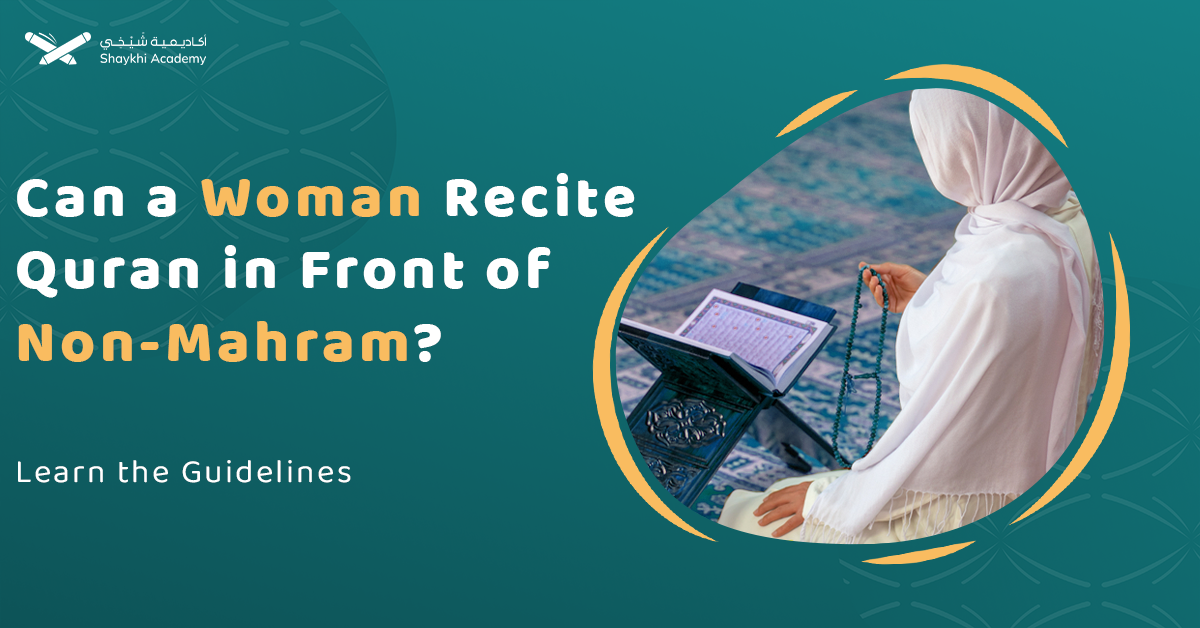Do women have the right to recite the Holy Quran in front of non-mahram men? Can they read the Holy Quran without the need to wear Hijab? Can they teach males? Does Islam give them these rights or not?
And if Islam gives them the rights to do so, what are the conditions, regulations, rulings and etiquette for doing that?
In this article, we will answer these questions and cast some light on the different aspects relating to this topic of discussion. Go no further.
Women Reciting the Quran in Front of Non-Mahrams:
A woman’s voice is not totally and categorically considered as Awrah (nakedness or private parts). It is permissible for the women to use their voices freely in so many cases; one of these cases is reciting the Holy Quran in public or in front of non mahrams.
What is considered as haram regarding a woman’s voice is using her voice to stir up the men’s sexual drives and make men sound horney.
The scholars built their opinion upon the fact that the Wives of our Prophet (PBUH) reported many hadiths to different male companions. Visit Shaykhi Academy’s Islamic Studies Online Course for more details about this doctrinal point.
Allah the Almighty says:
“O wives of the Prophet! You are not like any other women. If you fear [God], then do not be complaisant in your speech, lest he in whose heart is a sickness aspire [to you], but speak honourable words.” Surah Al-Ahzab, Verse, Num 33.
In this above Quranic verse, we notice that Allah didn’t prohibit the woman’s speech itself but rather, He prohibited the manner in which it is pronounced. Allah asked the wives of the Prophet not to make their speech complaisant or submissive if they intend to talk to men.
To sum up, it is permissible for women to recite the Holy Quran in the presence of non-Mahrams provided that their recitation is categorized with a normal tone of voice without any attempt to arouse any human instincts.
Rulings / Etiquettes of Reciting the Quran in Front of Non-Mahram
There are specific etiquettes that must be taken into consideration when women decide to recite the Holy Quran in front of Non Mahrams. Here they are:
1. Wearing Hijab
A woman who intends to read the Holy Quran in the presence of non-Mahram men, should wear a Hijab to cover her body and head. In other words, all Islamic rulings, regarding women’s clothing, must be respected.
2. Covering Head
She must cover her head not as a condition for reciting the Holy Quran but because there are non-mahram men seeing her.
3. Reciting in a Voice That Doesn’t Stir up Instincts
The voice of a woman’s recitation should be uniting in harmonious reverence. It should be devoid of any instinctive submission or softness. It should be a voice for Allah.
Important note:
However, it is better (mustahab) for a Muslim woman to try to avoid reciting the Holy Quran in front of non-Mahram men as long as there is no necessity for doing so.
What Does the Quran Say about Non-Mahrams?
Allah said in the Holy Quran:
“And tell the believing women to restrain their looks, and to guard their privates, and not display their beauty except what is apparent thereof, and to draw their coverings over their breasts, and not expose their beauty except to their husbands, their fathers, their husbands’ fathers, their sons, their husbands’ sons, their brothers, their brothers’ sons, their sisters’ sons, their women, what their right hands possess, their male attendants who have no sexual desires, or children who are not yet aware of the nakedness of women. And they should not strike their feet to draw attention to their hidden beauty. And repent to God, all of you believers, so that you may succeed.” Surah an-Nur, Verse 31.
Based on the above long Quranic verse, a woman’s mahrams are classified into a specific category that includes her husband, her father, her husband’s father, her sons, her husband’s sons, her brothers, her brothers’ sons, her sisters’ sons, her servant women, what her right hand possesses, her male attendants who have no sexual desires, and children who are not yet aware of the nakedness of women.
Accordingly, anyone who doesn’t belong to this category is considered non-mahram.
Our Prophet’s wives, Umm Salamah and Maimunah, ؓboth were with our Prophet (PBUH) when suddenly a blind companion of the Prophet came in, the prophet asked them to go inside. Umm Salamah said, “O Holy Prophet! But he is only blind, he can’t see us.”. Then the Prophet replied, “Is it that you are blind too?’ Narrated Abu Dawud and Tirmidhi.
Islamic jurists have stated that there is nothing prohibited when a woman looks at a strange male as long as she looks at him without any passion. They built their opinion upon the fact that A’ishah on the Eid day watched some youths who were presenting some sports games in the courtyard of the prophet’s Mosque.
The Prophet himself was watching these games with her as she was under the cover of his back. She kept on watching this activity until she got tired. The Prophet neither showed her his objection nor he prevented her from watching.
Can a Woman Read the Quran Without a Hijab?
Wearing a hijab is not an obligatory condition for a woman to read the Holy Quran as there is no evidence in the Holy Quran or the prophetic reports of Sunnah indicates that wearing Hijab is a must.
The majority of Islamic scholars stated that reciting the Holy Quran does not necessitate covering the woman’s head.
Moreover, when a woman recites the Holy Quran and she has to prostrate because she comes to sajdat At-tilawah, (prostration is done when facing specific Quranic verses), she can perform it (sajdat At-tilawah) without covering her head because this prostration is different from the prostration which is found in the 5 prayers. It doesn’t have the same rulings as the ruling of the prayer.
The sum up is that it is better (mustahab), not mandatory for a woman to cover her head before reading the Holy Quran.
Can a Woman Read the Quran Loudly?
Some people watch women on some TV channels or internet podcasts reciting the Holy Quran loudly. They wonder whether this activity is permissible (halal) or not!
In light of what we have mentioned earlier, there is no evidence that prevents women from reciting the Quran aloud or participating in Quranic events.
Etiquettes of Reciting the Quran Loudly for women
There is specific etiquette that must be taken into consideration when women decide to recite the Holy Quran loudly or in public. Here they are:
1. Sincerity of Intention
A woman who decides to recite the Holy Quran loudly should devote her intentions to Allah only. She should not seek fame or hypocrisy. Rather, she should seek Allah’s acceptance. Visit Shaykhi Academy’s Islamic Studies Online Course for more details about this doctrinal point.
2. Not to Beautify Her Voice
A woman who recites the Holy Quran loudly should not beautify her voice in order not to arouse any romantic passions.
3. Not to Soften Her Voice
A woman who recites the Holy Quran loudly should not soften her voice in order not to arouse any sexual Instincts.
Allah says in the Holy Quran, “O wives of the Prophet! You are not like any other women, if you observe piety. So do not speak too softly, lest the sick at heart lusts after you, but speak in an appropriate manner.” Surah al-Ahzab Verse 32.
يَا نِسَاءَ النَّبِيِّ لَسْتُنَّ كَأَحَدٍ مِنَ النِّسَاءِ ۚ إِنِ اتَّقَيْتُنَّ فَلَا تَخْضَعْنَ بِالْقَوْلِ فَيَطْمَعَ الَّذِي فِي قَلْبِهِ مَرَضٌ وَقُلْنَ قَوْلًا مَعْرُوفًا
4. Adherence to Islamic Lawful Clothing
All Islamic rulings, regarding her Hijab, her head’s covering and so on, must be respected.
Important Notes:
To sum up, it is permissible for women to recite the Holy Quran Loudly but it is undesirable and not recommended (not mustahab).
Can a Woman Teach a Man the Quran?
It is allowed for females to teach males the quranic knowledge such as the science of recitations and other related subjects such as syariah, fiqh, Prophetic AHadiths and so on.
There are no lawful restrictions that ban women from teaching men the science of the Holy Quran. Islamic jurists of fiqh have stated that there is nothing wrong concerning the mere existence of women with men at the same place as this action itself is not prohibited.
The prohibition only arises from the manner of mixing between the two sexes. If the communicating manner contradicts with the guidelines and teachings of the Islamic law (such as exposing parts of the bodies, connecting in illegal ways, talking for unlawful purpose), then it is haram.
What specifically is prohibited for a man and a woman is to be gathered alone in a private place where no one is able to have access to them.
Evidence about the Permissibility of Teaching Men the Holy Quran by Women
There are indications that allow women to teach males the Quranic knowledge. Here they are:
1. Hadith Sahl Ibn Saad,
Sahl ibn Sa’d, may Allah be pleased with him, said: “Abu Usayd invited the Prophet [PBUH] and his Companions to his wedding feast and his wife, Um Usayd, served them food and drink herself” Narrated by al-Bukhari and Muslim.
With respect to this Hadith, some jurists stated that separating between men and women, in public places, is not mandatory for every Muslim woman in general terms, but it is specific to the Wives of the Prophet; as Allah said in his book,
“And when you ask [his wives] for something, ask them from behind a screen.” Surah al-Ahzab Verse, Number, 53.
“وَإِذَا سَأَلْتُمُوهُنَّ مَتَاعًا فَاسْأَلُوهُنَّ مِنْ وَرَاءِ حِجَاب.”
According to the above Hadith and others, the jurists stated that women can communicate with men for different purposes such as, Buying, Selling, Learning and Teaching. Therefore, it is permissible for women to teach men the Holy Quran.
2. The Prophet’s Wives Taught Islamic topics.
It is worth mentioning that our Prophet’s wives and other Muslim women used to teach Islamic topics. Moreover, they reported hadiths about the Prophet to Muslim men.
The Islamic scholar, Ibn Hajar mentioned more than 1500 women in one of his books who worked in different fields of Islamic knowledge. They were fiqh scholars, narrators, reciters and so on. Some other Muslim women were even responsible for adjusting the community morals.
Start Your Worthwhile Journey of Learning Islamic Doctrinal Issues with Shaykhi Academy
Shaykhi Academy presents large sets of enhanced knowledge and information about the affluence and abundance of the Islamic doctrinal issues.
Shaykhi Academy’s Islamic Studies Online Course is a unique course for all learners. The course covers many essential topics about the roles of the Muslim woman in a Muslim society and how she can achieve moral values for her society. It also deals with additional thoughts and points of view.
Shaykhi Academy’s all-inclusive curriculums present immersive Islamic knowledge tailored professionally to benefit all learners.
Shaykhi Academy’s Islamic Studies Online Course is taught under the auspices of the experienced tutors Dr. Mahmoud AlAssal and Sh. Luqman ElKasabany.
All the teaching staff of Shaykhi Academy graduated from Al-azhr Ash-sharif University. They had wonderful experiences in the Islamic studies field. It is an essential matter to be taught under the aegis of such quality
Why Choose Shaykhi Academy?
- Connect with highly qualified native tutors.
- Flexible scheduling to suit your busy lifestyle.
- Affordable classes tailored for all levels.
- Accessible from anywhere around the globe.
Discover Our Range of Courses:
- Arabic Noorani Qaida: Lay a solid foundation for Quranic studies.
- Online Quran Classes for Kids: Engaging lessons for lifelong learning.
- Tajweed Rules for Kids: Learn to recite with confidence.
- Quran Hifz for Kids: Step-by-step guidance to memorize the Quran.
- Quran for Adults: Introduce yourself to Quran reading and Tajweed rules.
- Online Arabic Courses: Master the language of the Quran.
- Islamic Studies: A wide range of topics related to Islam, including theology, law, Quranic studies, Hadith.
Don’t Miss Out on Your Chance to Excel!
Whether you’re a beginner or seeking advanced knowledge, Shaykhi Academy can guide you! Book your free trial now!

Conclusion
The woman has a critical role in the Islamic Law; each Muslim woman should do her best to serve the Holy Quran in a way that does not oppose the Islamic Sharia.
The sum up is that the great majority of the Islamic jurists besides, many great fiqh scholars agree that women can recite the Holy Quran in the presence of non-Mahram men. But it is not recommended to do that as long as there is no necessity for doing so.

















































